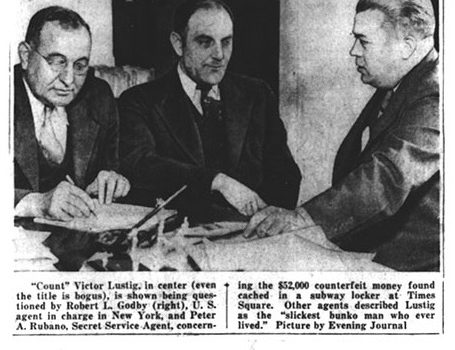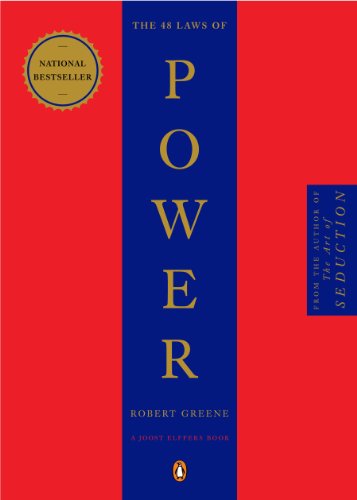

This article is an excerpt from the Shortform summary of "The 48 Laws of Power" by Robert Greene. Shortform has the world's best summaries of books you should be reading.
Like this article? Sign up for a free trial here .
Who was Victor Lustig? What made him one of the greatest conmen in history? What can we learn from him?
Victor Lustig was a stylish swindler who successfully scammed people throughout Europe and the United States in the early 1900s. Although he ended his life in prison, Victor Lustig was a powerful force at his peak. We’ll cover the three primary lessons about power we can learn from Victor Lustig.
Victor Lustig Lesson #1: Be Mysterious
Victor Lustig proved the power of mystery. People are attracted to those who seem mysterious, so cultivate an air of mystery yourself. Be vague about what you’re doing or plan to do. Don’t show all your cards and you’ll create an atmosphere of anticipation — people will pay attention to see what you do next. Use mystery to deceive, enthrall, and intimidate.
Victor Lustig’s Power of Unpredictability
Victor Lustig knew that we’re drawn to things we can’t explain. In ancient times, when the world seemed frightening and inexplicable, people invented gods and myths to explain diseases, natural wonders, disasters, and other things they couldn’t understand. Today, we explain natural phenomena with science and reason, but people still crave the inexplicable and mysterious. People gravitate to enigmas. They have drawing power because they’re open to interpretation, imagination, and awe, unlike our mostly familiar and predictable world.
Con artists attract people by seeming mysterious, then distract them while fleecing them. For example, Victor Lustig pretended to be a count; he dressed expensively, but always wore an odd accessory. He hung around hotels acting in ways that got people buzzing. He was so interesting and distracting that people who got close to him didn’t notice they were being robbed.
You can attract attention the same way, by being inscrutable. You don’t need to be extraordinary to create a sense of mystery about yourself — you can succeed while being more subtle, making mystery part of your mien.
By practicing silence and restraint, making occasional ambiguous remarks, being purposely inconsistent, and appearing eccentric, you’ll project an aura of mystery, which others will build up by trying to interpret what you say and do.
Victor Lustig let mystery do some of his work for him. Some benefits of seeming mysterious include:
- An element of mystery can make you appear brilliant and profound, even if you’re average or mediocre. For example, Mata Hari, the famed dancer, wasn’t a great beauty or an extraordinary dancer, but she enthralled her audiences because she seemed exotic and kept changing her background story.
- You have the upper hand when you force others to try and figure you out. It puts them on the defensive.
- You can inspire fear because people are unnerved by uncertainty and things they don’t understand.
- Mystery draws attention and gives you an intimidating presence as a leader. Example: Mao Tse-tung mystified everyone, including his wife, by being unpredictable and contradicting himself. People felt they had to pay attention because no one knew what he might do next.
If you can’t be mysterious all the time, create enigmas. Do something periodically that doesn’t jibe with others’ perceptions and expectations of you, to keep them on edge and focused on you.
Victor Lustig Lesson #2: Argue Your Case
Generally, Victor Lustig depended on more subtle means to deceive, but he also teaches us that sometimes, we need to state our case. There’s one time when arguing is the right strategy — when you’ve been caught in a lie and need to distract others from your deception. In that case, argue strenuously and with conviction. The more emotional you get, the more likely people are to believe you.
Count Victor Lustig practiced this technique. He scammed many people by selling a box that he claimed was a money-making machine. Usually, when it didn’t work, people were too embarrassed to report they’d been swindled.
But one victim, a sheriff, confronted Victor Lustig. Lustig argued vehemently, with a lot of baffling terminology, that the sheriff must have damaged the box or used it incorrectly. Victor Lustig offered to give the sheriff back his money, plus written instructions and promised to visit the sheriff and examine the box. Lustig handed over a hundred hundred-dollar bills and the sheriff departed satisfied. Later, however, he was arrested and convicted for passing counterfeit notes. Victor Lustig won the argument and never heard from the sheriff again.
Victor Lustig Lesson #3: Disarm Others By Being Nice
Victor Lustig was nice, but his niceness was a means to an end. You, too, can use honesty and generosity to disarm and distract others from your schemes. It works because even the most suspicious people respond emotionally, like a child, to acts of kindness.
Victor Lustig’s Honesty-as-Distraction Technique
Deception and distraction go hand in hand. Distracting people gives you time to set up your trap or scheme to deceive them without its being noticed.
Victor Lustig ingratiated himself with gangster Al Capone by appearing to be honest. Capone, who was accustomed to dealing with dishonest people, was caught off guard by Lustig’s unexpected honesty, which softened Capone up for Lustig’s real swindle.
One of the most effective methods of distraction is to surprise them with honesty or generosity. This approach disarms people by allaying suspicions and bringing out their inner child — they respond with eager, childlike gratitude.
The Chinese called this practice “giving before you take” — the gift distracts your victim while you do the taking. The gift can be anything including a physical gift, an act of kindness, a favor, or a seemingly honest admission.
It can be used to create an immediate distraction from what you’re doing or to soften someone up for future actions or requests.
For your first meeting with someone, start with selective honesty. If someone believes you’re honest from the outset, it takes a lot to dislodge that belief, which gives to time get your plans in place. You can turn this into a reputation for honesty with a series of small acts.
Victor Lustig Swindles Al Capone
Not many people would have tried to swindle Al Capone. But the notorious con man Victor Lustig succeeded because he understood human nature, and knew that even a gangster has human emotions.
Since Capone operated in an environment of distrust and scheming, Victor Lustig made a show of committing a seemingly honest act, in order to distract him.
He requested $50,000 from Capone, promising to double it in sixty days. Victor Lustig put the money in a safe-deposit box and did nothing with it. He later returned the original amount in full, with profuse apologies to Capone for failing to increase it. Capone was impressed with Victor Lustig’s honesty in returning the money and immediately gave $5,000 back to him as a reward (which is what Lustig wanted in the first place).
Al Capone, like everyone else, was susceptible to an unexpected act of goodwill. While trying to con an Al Capone might not be advisable for the inexperienced, the incident shows the power of selective honesty as a means to an end.
The Exception to Lesson #3
Fake generosity or honesty won’t fool anyone when you already have a reputation for deceit. In this case, admit to what you are: a scoundrel. Embrace your reputation for dishonesty.
Victor Lustig was about to sell the Eiffel Tower to an industrialist. Lustig had convinced the man that he represented the French government that was auctioning it off for scrap metal. A last-minute doubt stopped the industrialist from handing over his money. Victor Lustig sensed this, and to put the man at ease, he flaunted his dishonesty by asking for a bribe. By acting dishonest (as many government officials were known to be), Victor Lustig appeared genuine and his scheme succeeded. In his career, he actually “sold” the Eiffel Tower twice.
In a strange way, you can honestly use your dishonesty as a cover for your schemes.
Con artist Victor Lustig won the trust and then swindled the newly rich by seeming to offer the friendship, validation, and social connections they hungered for. Although we may not want to be as deceptive as Victor Lustig in everyday life, there are key lessons we can learn from Victor Lustig.
———End of Preview———

Like what you just read? Read the rest of the world's best summary of "The 48 Laws of Power" at Shortform . Learn the book's critical concepts in 20 minutes or less .
Here's what you'll find in our full The 48 Laws of Power summary :
- Why you should never outshine your boss
- How to appear like a friend but behave like a spy
- The 6 rules you absolutely must not violate, if you want to be successful






